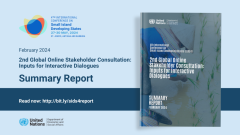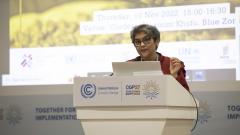- عربي
- 中文
- English
- Français
- Русский
- Español
Statement at the Luncheon Meeting on Graduation, International Support Measures and Leveraging Implementation of Sustainable Development Goals
Statement by Ms. Fekitamoeloa Katoa ‘Utoikamanu, High Representative for the Least Developed Countries, Landlocked Developing Countries and Small Island Developing States
16 April 2019
New York, USA
Excellencies,
Distinguished delegates,
Ladies and gentlemen,
We are here together around an issue of strategic importance! Thank you to the Permanent mission of Bangladesh to once more spearhead this meeting and pushing us to continue to be active. In recent years, a growing number of countries are now meeting graduation thresholds. Our glass indeed is becoming half full. Twelve countries are now at different phases of graduation. I have said it over and over since I took office, yes this is good news but we MUST pay attention to ensure the sustainability of this very encouraging trend we see. Graduation does not mean " END - all is done " no, it means having reached considerable levels of development and resilience.
Graduation represents an overall strength of the economy and stability in economic progress. Graduation means we have a solid platform to preserve and build from. And let us not forget, nothing stands still and challenges for all countries only seem to get more intricate, complex and ever faster in their happening! The intricate sustainable development challenges that the country faces as an LDC indeed does not just disappear overnight or because we say graduation has happened. Most of the graduating and graduated countries continue to face considerable domestic imbalances in levels of development, high levels of poverty as well as economic and environmental vulnerabilities.
Yet, the recently graduated countries have experienced reductions of the share of grants in total official assistance flows and lost access to LDC-specific concessional funding sources. With this, many LDCs now actually apprehend graduation because it may negatively affect development financing and prospects. Countries are calling for continued international support after graduation for defined periods of time to consolidate and build on gains made. Some provisions to continue support to LDC graduated countries exist.
These exist for a period of three to five years, namely the Everything but Arms (EBA) initiative of the EU,support to actively engage in the work of the UN GA, accessto the Enhanced Integrated Framework, accessto NAPA funding and I add capacity building support from the technology bank for LDCs. But is this sufficient and targeted enough? I table before you a couple of thoughts on support measures that could be considered for LDCs:
i. Technical support and advice to carry out more in-depth analysis of the potential impacts of graduation and identification of additional support to address the challenges of graduation;
ii. Dedicated capacity-building support to enhance access to new sources of financing, from domestic and international resources;
iii. Facilitating increased access to other means of financing, including private finance, green bond financing and GDP-indexed bonds;
iv. Continuation of capacity building support and flexibility under the WTO;
v. Continued access to concessional funding for climate change mitigation and adaptation - this is very important given the high and often disproportionate vulnerability of the countries to the impacts of climate change AND
vi. Increasing the flow of FDI through various investment support measures.
I see this as a package deal toward sustainability of gains made and as an insurance against the risk of falling back into the category of LDCs. But these also would be strong measures to support the achievement of the SDGs by 2030. Excellencies, Ladies and Gentlemen, As we all know, the UN system has an important role in supporting LDCs to prepare their graduation and smooth transition strategies. The QCPR resolution of 2016 requests the United Nations development system to provide assistance to graduating countries in both the formulation and implementation of their national transition strategies
. It also requests to consider country-specific support for graduated countries for a fixed period of time and in a predictable manner. Within the parameters of this resolution adopted by member states and to contribute to coordinated UN system support to graduating and graduated countries, OHRLLS established an Inter-Agency Task Force on LDC Graduation and Smooth Transition in late 2017.
The Task Force has focused its work on supporting information exchange on activities related to graduation, raising awareness and, most importantly, on providing a strengthened, coordinated delivery of UN support to graduating countries. At the request of countries, we are planning to send a joint UN mission to some graduating countries. The joint mission outcome should provide us all with (i) in-depth knowledge of the process and policy advice, (ii) facilitate learning from experiences of other graduating or graduated countries and (iii) effectively assist countries’ requests for postgraduation support. Yes, graduation is a milestone achievement for LDCs but also for the international community at large in our shared strive for peace, security and leaving no one behind. It now is our shared, our collective responsibility to ensure not to squander hard won gains. Loss of momentum is not an option.
We therefore urge the international community to continue their support to graduating and graduated countries to sustain their development progress keeping in mind that this also will strongly support achievement of the 2030 Agenda. Thank you.





